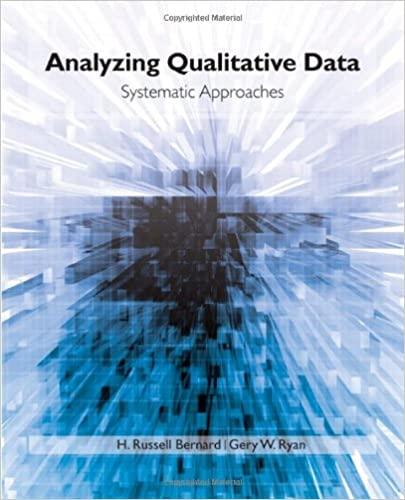Answered step by step
Verified Expert Solution
Question
1 Approved Answer
Comment/ respond to post Post The science approach differs from others in that science does not obtain knowledge through common sense, religion, spiritual beliefs, or
Comment/ respond to post Post The science approach differs from others in that science does not obtain knowledge through common sense, religion, spiritual beliefs, or advertisements. Rather, science seeks to obtain knowledge through facts. These facts or universal laws are not attached to opinions or beliefs; therefore, science cannot be used to validate any such truths held by any established group. Science uncovers knowledge that can be categorized into one of the three levels of understanding: description, prediction, and control (Cooper et al., 2020). Description is a method for systematically observing a phenomenon to understand and describe it accurately. The observations can then be quantified, classified, and examined to determine if the observations relate to other facts. With this information, there is a possibility for developing a hypothesis, which then leads to further research into the phenomenon to seek further understanding (Cooper et al., 2020). Another goal of science is prediction, which is determining that two events are related as the result of repeated observation. It is the ability to predict that one event occurs in the presence of another vent. This relationship is then termed correlation. Correlation is used to predict to what extent an event will occur in the presence of another event. It is important to remember that revealing a correlation does not demonstrate control, as no variables are manipulated or controlled (Cooper et al., 2020). Lastly, control is a third scientific level of understanding and leads to the establishment of functional relationships. Demonstrating a functional relationship occurs when a controlled experiment can manipulate one event to reliably initiate a change in another. The manipulated event is the independent variable, and the event that changes is the dependent variable. Control also accounts for extraneous factors to ensure that these factors are not responsible for the change (Cooper et al., 2020). There is a set of philosophical assumptions or attitudes that are important to the foundation of applied behavior analysis (ABA). They are considered attitudes of science and include determinism, empiricism, experimentation, replication, parsimony, and philosophical doubt. All scientists share these attitudes as they are built on the assumptions of properly conducting research (Cooper et al., 2020). Determinism: Every event in the universe is orderly, lawful, and predictable and can be determined by physical causes. Empiricism: Information is obtained through the senses, and all conclusions should be based on evidence gathered using the senses. Experimentation: The strategy used to conduct research with the goal of prediction and control. Replication: All experiments must be repeated to determine the reliability and increase the generality of the findings. Parsimony: In the investigative process, all simple and logical explanations must be ruled out before considering more complex explanations. Philosophical Doubt: Also known as skepticism, is the attitude that scientists should always question the facts as new discoveries may lead to new truths (Fisher et al., 2021). A token economy elicits behavior change by reinforcing target behaviors with tokens, which can be exchanged for preferred, individualized reinforcers (Cooper et al., 2020). Ackerman et al. (2020) conducted a study to determine how to make token economy systems effective. The first component in the study directly aligns with the dimension of behavior since they recommend identifying the target behaviors. Implementing a token economy is also conceptually systematic, as Ackerman et al. (2020) include their research on how to make token economies the most effective. A schedule is set for reinforcement, highlighting the technological dimension as the study could be replicated using component four, setting a schedule for how and when tokens will be delivered (Ackerman et la., 2020). Regarding the scientific level of understanding, Ackerman et al. (2020) and their team created an experiment to change behaviors based on the known function of the target behaviors. The team then predicted how to control the behavior based on the functions and created a menu of backup reinforcers that would be used to demonstrate control. Their team considered the attitude of experimentation by utilizing a fidelity checklist to ensure the effectiveness of the token economy. References Ackerman, K. B., Samudre, M., & Allday, R. A. (2020). Practical components for getting the most from a token economy. Teaching Exceptional Children, 52(4), 242-249. Cooper, J. O., Heron, T. E., & Heward, W. L. (2020). Applied behavior analysis (3rd ed.). Pearson. Fisher, W. W., Piazza, C. C., & Roane, H. S. (2021). Handbook of applied behavior analysis (2nd ed.). Guilford Press
Step by Step Solution
There are 3 Steps involved in it
Step: 1

Get Instant Access to Expert-Tailored Solutions
See step-by-step solutions with expert insights and AI powered tools for academic success
Step: 2

Step: 3

Ace Your Homework with AI
Get the answers you need in no time with our AI-driven, step-by-step assistance
Get Started


